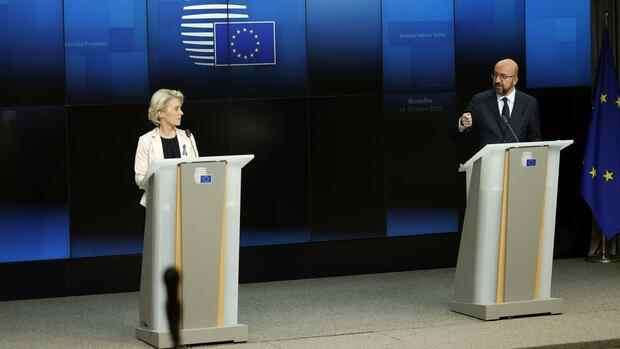The EU’s concept should follow the vaccine purchase in the corona pandemic.
(Photo: dpa)
Brussels The EU Commission is pushing ahead with plans for joint European procurement of natural gas. With a uniform purchasing concept, Europe is increasing its bargaining power, Commission President Ursula von der Leyen said on Friday at the EU summit in Brussels. Similar to the ordering of vaccines in the corona pandemic, the Commission is proposing to act as a European unit on the energy markets.
The background is concerns that the EU countries are snatching scarce resources from each other for fear of supply bottlenecks. “Instead of outbidding each other and driving up prices, we should put our weight on the scales together,” warned von der Leyen.
To this end, the head of the Commission wants to create an “EU energy platform” through which supply contracts for liquefied natural gas (LNG) and pipeline gas are to be negotiated. “We bundle our demand and turn to international partners,” von der Leyen outlined her concept. “In parallel, we are using storage facilities in some Member States for the benefit of all.”
Russia’s aggression against Ukraine has upended Europe’s energy policy. For years, the problematic dependence on Russia was discussed in Brussels and a “diversification” of sources of supply was called for, but hardly anything has happened.
Top jobs of the day
Find the best jobs now and
be notified by email.
Germany in particular placed blind trust in the “energy partnership” with Moscow that had grown over decades. Now the bloody invasion has shattered the illusion that Russia is a reliable supplier of raw materials.
The federal government is working feverishly to replace Russian gas. One is particularly busy: Economics Minister Robert Habeck. In the past few weeks, the Greens politician has been to the USA, Norway and Qatar to secure additional gas supplies for the German energy industry. The Federal Ministry of Economics has even started buying LNG itself and storing it in gas storage facilities.
In doing so, however, Germany is actually competing with countries such as Italy, which are pursuing the same goal. Because the gas reserves available on the world market are scarce.
As a result, there is growing concern in Brussels that the member states will fall into an energy nationalism that will ultimately harm all Europeans. Habeck aroused particular suspicion with his shopping spree. “If the Germans go it alone, it will jeopardize European solidarity,” an EU diplomat recently complained in the Handelsblatt. Comparisons are already being made with the first phase of the corona crisis, when Europeans fought each other for protective clothing, masks and fans.
“Taskforce” planned with suppliers and member states
With its proposal for a procurement platform, the EU Commission wants to counter the reflex of the governments to initially only think about national needs. However, the details are still open. The plan is to set up a “task force” in which suppliers and member states can have a say.
For the task force, it is also important to ensure that the existing gas infrastructure is used optimally. Because the landing capacities for the LNG transported by tankers are limited in Europe. In Spain, for example, there are many suitable ports, but the gas network there is poorly connected to the other networks in the EU.
At the end of the Brussels summit, Chancellor Olaf Scholz (SPD) confirmed that the EU was working on expanding the infrastructure “in order to push the quantities to where they are needed”. Germany still has a lot to do in this regard. So far, the Federal Republic does not have a single port terminal where LNG could be landed. A fact that in other EU countries the anger about German gas purchases is increasing: Germany stocks up on the world market, but relies on the port facilities of its neighbors, it is said behind closed doors.
The Chancellor, on the other hand, emphasized that the EU summit was a “sign of unity”. Scholz avoided clearly backing the commissioner’s plans. He could imagine “voluntary cooperation” in gas procurement, he said. This is what the EU states agreed in the summit declaration. Scholz pointed out that organizing a joint purchasing platform was “not very easy” because gas deals are primarily a matter for private sector players.
Meanwhile, Habeck tried to refute the accusation of “energy nationalism”. There is “great agreement” in the Western community about the goal of becoming independent of Russian energy supplies in order to “put a stop to Russian President Putin,” said the Economics Minister in Berlin on Friday. There is a regular exchange with the western partners.
At the same time, however, it makes sense for the federal government to make an additional effort to find new suppliers. Habeck is convinced that coordinated European action does not exclude individual efforts by individual governments: “You have to do one thing without neglecting the other,” he said.
More: Germany picks up pace as it moves away from Russian energy
